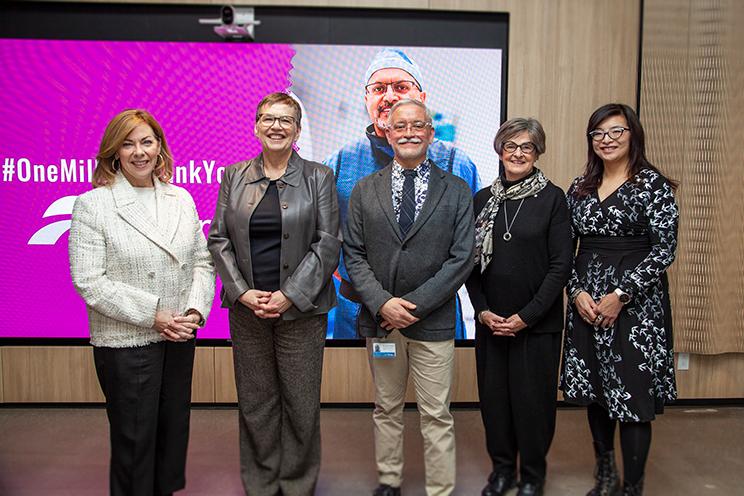
Funded by a $1-million donation from Emera, the QEII Foundation’s Health Equity Fund aims to support researchers and healthcare leaders whose work advances health equity for Nova Scotians, regardless of race, gender, language or ability. From left: Karen Hutt, Emera; Susan Mullin, QEII Foundation; Joshua Edward, NS Health; Sherry Porter, QEII Foundation We Are campaign chair; and San Patten, community advisory board member for the QEII Foundation’s Health Equity Fund. DARREN HUBLEY
Significant Emera donation supporting QEII Foundation's Health Equity Fund
Nova Scotia is tackling the issue of discrimination in the healthcare system with a Health Equity Fund, the first of its kind in Canada.
The QEII Foundation’s Health Equity Fund aims to support researchers and healthcare leaders whose work advances health equity for Nova Scotians, regardless of race, gender, language or ability. The work will be funded by a $1-million donation from Emera that will fund the grants at $200,000 a year for the next five years.
The fund is for projects that will contribute to advancing knowledge and understanding of health equity, including initiatives focused on rigorous research and innovation projects, data collection, and analysis to equitable healthcare access and outcomes, as well as projects that involve creative and practical solutions aimed at improving health equity.
Joshua Edward, director of research development at Research, Innovation & Discovery at Nova Scotia Health, has been part of the project since the first meeting with the QEII Foundation in the spring of 2023.
“It’s about building better and stronger research, period. Making research as diverse as possible broadens the data that we’re collecting. Sometimes the impacts might originally come from one group, but we find that it’s applicable to a totally different context,” Joshua says. “You don’t always know where the best and biggest and boldest ideas are going to come from.”
Throughout his career Joshua has worked in public health with Indigenous communities, people who are gender and sexual minorities, and with people who have addictions and co-occurring substance use and mental health disorders.
His experiences taught him that solutions sought for certain populations can ripple out and improve health care for others.
For example, in the 1990s, a research lab investigated a new cellular therapy primarily to help individuals living with HIV/AIDS — a population at the time that would have primarily been gay and bisexual men, injection drug users, and other stigmatized populations. While the new therapy didn’t work well as a potential treatment for HIV/AIDS, it was applied to other illnesses and has proven to work phenomenally for certain types of cancer.
Today, it is known as CAR-T therapy and has provided hope and options for treatments for many individuals who had few if any cancer treatment options left.
CAR-T research at Nova Scotia Health is also generously supported by donors at the QEII Foundation.
Another example is some Nova Scotian communities with below-average vaccination rates.
“If we’re able to look at a community that has deeply held concerns around vaccination — with some of those concerns rooted in historically inequitable and unethical research — and we’re able to figure out ways to engage that community through research in ways that helps them become more educated about vaccination, we may see vaccination rates go up,” Joshua explains.
“When we learn about how to work with communities to address concerns about vaccination, and apply them through a research perspective with evidence-based approaches, we might learn lessons on how to work better with all communities to address concerns about vaccination.”
Emera donation benefits Health Equity Fund
Karen Hutt, an executive vice-president with Emera, says the $1-million gift will help modernize health care in Nova Scotia.
“The launch of Canada's first Health Equity Fund has the potential to deliver innovative new solutions and create a healthier and more equitable future for Nova Scotians,” she says.
“As an international company proudly headquartered in the province, we believe in supporting the communities where our employees live and work. Partnering with the QEII Foundation is reflective of our own journey towards creating an inclusive and equitable culture.”
Susan Mullin, president and CEO of the QEII Foundation, says the vision is that someday health equity will be standard of care.
“At every stage of health care, from research to planning health services and delivering care, diverse perspectives are required. Truly examining all aspects of healthcare delivery requires an investment and a commitment for making our community stronger, more innovative and more inclusive,” she says.
“We are extremely grateful to Emera for partnering with us to establish the QEII Foundation’s Health Equity Fund with their $1-million donation. Their investment will empower change, remove barriers and fund solutions that ensure all Nova Scotians receive care grounded in inclusive practices.”
The community advisory board, which includes Nova Scotians with lived experience in health equity, including African Nova Scotians, immigrants, refugees, Asian Canadians and 2SLGBTQIA+ people, will be responsible for reviewing and vetting expressions of interest for possible grants.
“My best-case scenario is that we find the best ideas out of the gate and we’re able to support those researchers at the ground floor,” Joshua says. “This is valuable work with potential impacts for all Nova Scotians.”


